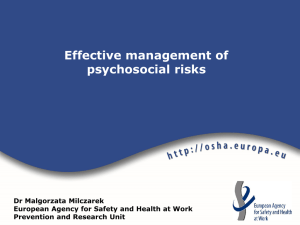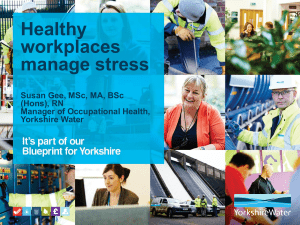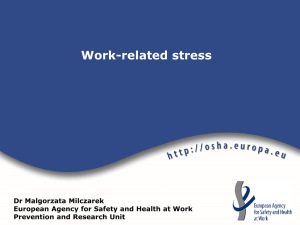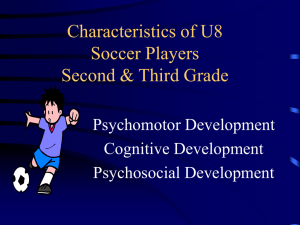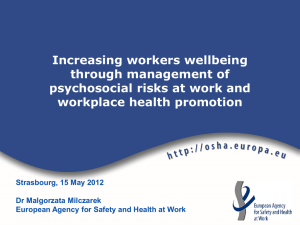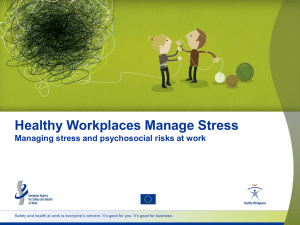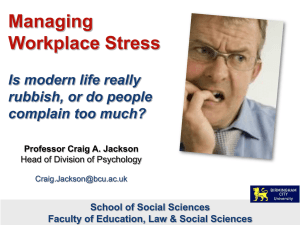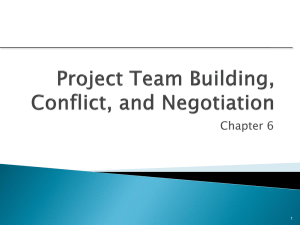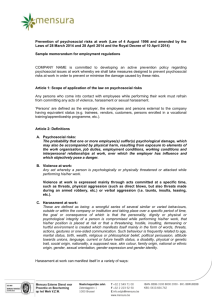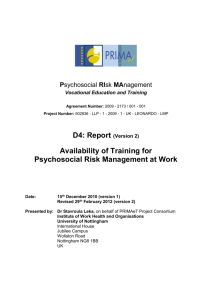How to tackle psychosocial risks?
advertisement
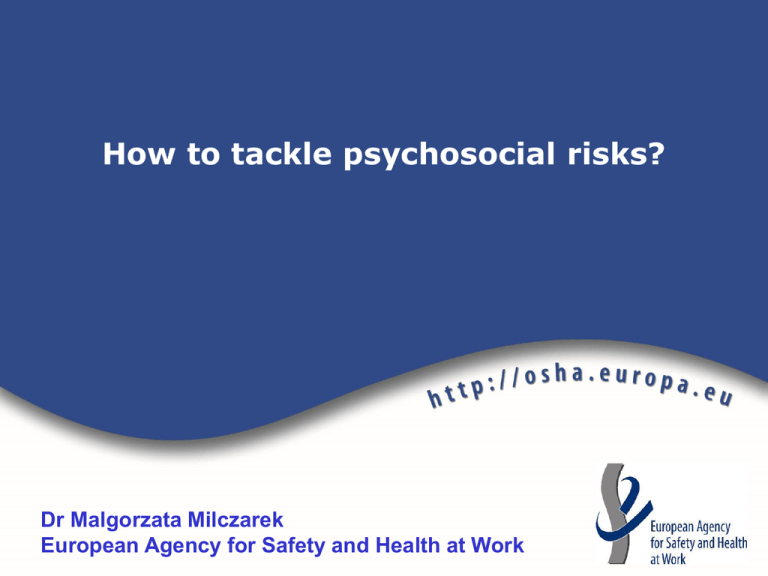
How to tackle psychosocial risks? Dr Malgorzata Milczarek European Agency for Safety and Health at Work Managing psychosocial risks Employers have an obligation to manage work-related stress, through the Framework Directive 89/391/EEC. Framework agreement on work-related stress (2004) Framework agreement on harassment and violence at work (2007) increasing the awareness and understanding of employers, workers and their representatives of work-related stress, workplace harassment and violence, providing employers, workers and their representatives at all levels with an action-oriented framework to identify, prevent and manage problems of work-related stress, harassment and violence at work. Main difficulties in dealing with health and safety and with psychosocial risks % establishments, EU-27 100% 90% 80% 70% 60% 50% 40% 30% 20% 10% 0% Lack of resources such as time, staff or money Lack of aw areness Lack of expertise Health and safety Culture w ithin the establishment Sensitivity of the Lack of technical issue support or guidance Psychosocial risks Health and safety issues raised regularly in high level management meetings % establishments 100 80 60 40 20 LT EE SI LV CH EL TR PT AT HU PL DE HR IT M T CY ES LU CZ FI TO B TA G L 31 RO EU -2 7 FR BE SK DK IE NO NL UK SE 0 Managing psychosocial risks The key to manage psychosocial risks and prevent work-related stress lies with the organisation and management of work. Risk assessment for psychosocial risks involves the same basic principles and processes as for other workplace hazards Including workers and their representatives in the process is crucial to success. Risk Assessment – the 5 steps Identify the hazards and those at risk Evaluate and prioritise the risks Monitor and review the situation Decide on preventive actions Take action! Consult the workers – both on the hazards and risks and on the proposed solutions Identifying hazards Psychosocial risks Control: Low participation in decision making, lack of control over work methods Organisational culture & function: Poor communication, lack of definition of, organisational objectives Interpersonal relationships at work: conflicts, lack of social support Role in the organisation: role ambiguity, role conflict Career development: career stagnation and uncertainty, job insecurity Home-work interface: conflicting demands of work and home Identifying hazards Psychosocial risks Job content: lack of variety, under use of skills Workload & work pace: work overload or under load, machine pacing, time pressure Work schedule: shift working, night shifts, inflexible work schedules, unpredictable hours, long or unsociable hours Environment & equipment: inadequate equipment availability, suitability or maintenance, lack of space, poor lighting, excessive noise Organisational and individual symptoms of stress Managing psychosocial risks Effective measures in preventing psychosocial risks and work-related stress include: allowing enough time for workers to perform their tasks providing clear job descriptions rewarding workers for good performance enabling workers to make complaints and have them taken seriously giving workers control over their work minimising physical risks Managing psychosocial risks Effective measures in preventing psychosocial risks and work-related stress include: allowing workers to take part in decisions that affect them match workloads to the capabilities and resources of each worker designing tasks to be stimulating defining work roles and responsibilities clearly providing opportunities for social interaction avoiding ambiguity in matters of job security and career development Publications and practical tools Factsheets Work-related stress; Bullying at work; Violence at work Reports Research on Work-related Stress; How to Tackle Psychosocial Issues and Reduce Work-related Stress. OiRA – Online interactive Risk Assessment – Psychosocial modul - Micro and Small Enterprises - hazard identification and preventive measures Multi-sectoral guidelines to tackle third party violence and harassment at the workplace (EFPS) How to prevent and deal with workplace violence (ETUCE) EU-OSHA European Campaigns Raising-awareness campaigns “Working on Stress” (2002) 2014 – 2015: “Practical solutions for psychosocial risks” Work-related stress can be successfully managed Promoting tools and methods that have been developed over the last decade to manage work-related stress, violence and harassment Disseminating good practice examples (at both national & EU level), including tools for workers’ representatives and line managers Thank you for your attention! EU-OSHA: http://osha.europa.eu Malgorzata Milczarek: milczarek@osha.europa.eu
